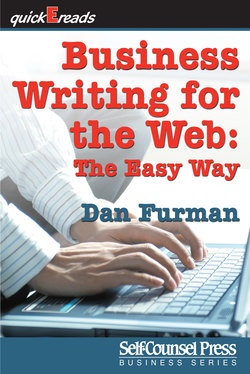Читать книгу Business Writing for the Web - Dan Furman - Страница 3
На сайте Литреса книга снята с продажи.
Introduction
ОглавлениеOkay, it’s time to discuss website writing. Or writing for the web. Or writing website copy…
Whichever name you prefer (and I’ll generally be calling it web copy from here on out), it’s probably THE most important part of your website. In my opinion, it’s even more important than design. Of course, me being a writer, one would expect me to think that, but think about this: Some of the most successful websites out there are those long sales letter pages that have almost no design at all. Some are just blank white pages with tons of words. And many of them convert very nicely.
Think about that: almost no design at all.
Now I don’t want web designers getting upset. I’m not advocating that design isn’t needed (don’t come to my house with torches or anything). For almost all business sites, design is entirely necessary. In fact, it’s VERY necessary. Bad design will drive people away before they even start reading. Throw up green text on a yellow background with orange spots (heh — it was completely unintentional that I chose the words “throw up” for that description) and people will probably leave rather quickly (and the one guy who stays is a perpetually stoned 60-year-old hippie who isn’t buying anything, but really likes your colors).
So yes, design matters; it pulls (the right) people in. But, I AM saying that when it comes to conversion, the words matter more.
Website copywriting is definitely the main part of my business, so I’m going to spend some time on this. Thus, to make things simpler, I have broken the topic up into 11 rules. This makes things far more manageable, and easier to read.
Since I am doing it that way, some of the advice may be repeated in several sections, and some of it might even seem to contradict other parts (this is because writing web copy is NOT an exact science). What works for one type of website might not work quite as well for another, and the only way to find this out is to test. So (as usual), I am expecting you to take these rules and tweak them to your situation (and test the results). In addition, these rules are basic rules, and meant to generally be followed no matter what page (Home, About Us, etc.) or type of website for which you are writing.
Before we start, let’s discuss persuasive writing and action words. They are misunderstood concepts, and I see them in every book about writing.
I don’t have a rule that says, “Here’s how you write persuasively.” That’s because, taken collectively, my 10 (well, 11) rules will result in persuasive writing all on their own. Believe me, I have never once sat down to write and said, “Okay, let me turn on the persuasion.” Yes, I advertise my writing as persuasive, because that’s naturally what it is. And it’s naturally that way because of my rules. Follow my rules and you’ll be persuasive.
I also do not believe that there is a mystical set of action words that will magically transform your writing. I know this isn’t conventional thinking; every “marketing writing” book I have ever read says to use action words. Well, I’m not going to tell you to do that. Instead, I will give you some very effective “confidence” words and phrases in Rule 7. But these are to be used in addition to your writing, not in place of anything. I do not believe in forcing you to do anything in regards to writing. So instead, fit these 11 rules into your current writing.
In other words, I’m not here to change your writing. I’m here to help make your writing (and your web copy) better. There’s a big difference.
